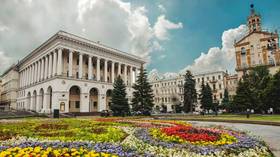Kiev conservatory refuses to give up Russian composer’s name


The Pyotr Tchaikovsky National Music Academy of Ukraine (UNTAM) refused earlier this week to remove the name of the iconic Russian composer from its official title.
Removing links to Russia in the names of streets and various entities has become a trend in Ukraine since the launch of Moscow’s military operation in the country. Earlier this week, it was decided to give new names to several stations of the Kiev subway. For example, Leo Tolstoy Square has been renamed in honor of Vasyl Stus, a local poet. There is also a proposal to change all Pushkin Streets across Ukraine to bear the name of the American writer Stephen King, who has condemned the Russian offensive.
However, the academic board of the Kiev conservatory, which convened on Thursday, made it clear that the organization had no intention of joining this trend.
“Governments and armies can fight, but cultures can never fight each other. They can only compete or enrich themselves,” Yury Rybchinsky, a prominent Ukrainian songwriter and member of UNTAM’s supervisory board, said during the gathering.
“Tchaikovsky, like Shakespeare, like Joan of Arc, like Christ, does not belong to one specific people, he belongs to the whole world,” he insisted.
Rybchinsky also went on to suggest that Tchaikovsky’s name should be kept in the conservatory’s title as he “was not Russian” by nationality. The classic composer’s father came from a family of Zaporozhian Cossacks, while his mother was French, he argued.
Tchaikovsky also “treated Ukraine with incredible love” and used motifs from Ukrainian folk music in some of his works, Rybchinsky added.
The composer of the music for the iconic ballets ‘Swan Lake’ and ‘The Nutcracker’ visited Ukraine, which was part of the Russian Empire in the 19th century, on many occasions. He was also among the founders of the Kiev conservatory.
During its session, the UNTAM’s academic board unanimously voted in favor of sending a letter to Ukrainian President Volodymyr Zelensky about the situation. In their address, the members stressed the danger of “manipulations” involving Tchaikovsky’s name.
They also called upon the country’s authorities to take all the necessary measures to “return the composer with Ukrainian roots to Ukraine, protect his legacy from being used by the aggressor [Russia] as a tool to destroy the Ukrainian essence.”
In April, the Geneva-based World Federation of International Music Competitions expelled the International Tchaikovsky Competition, which has been held every four years since 1958 in Moscow and Saint Petersburg, from its ranks over the ongoing conflict between Moscow and Kiev.
A month before that, the Cardiff Philharmonic Orchestra in Wales made headlines after removing Tchaikovsky from a program, deeming the works of the Russian composer “offensive.”